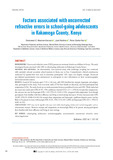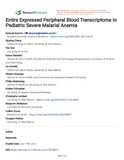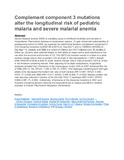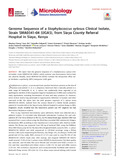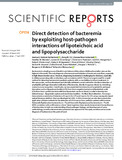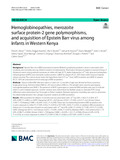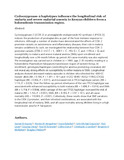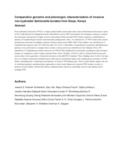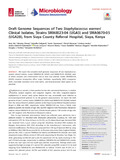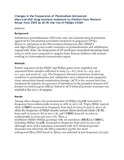Search
Now showing items 1-10 of 18
Nonsynonymous amino acid changes in the α-chain of complement component 5 influence longitudinal susceptibility to Plasmodium falciparum infections and severe malarial anemia in kenyan children
(Frontier in genetics, 2022-08-14)
Background: Severe malarial anemia (SMA; Hb < 5.0 g/dl) is a leading cause of childhood morbidity and mortality in holoendemic Plasmodium falciparum transmission regions such as western Kenya.
Methods: We investigated ...
Entire Expressed Peripheral Blood Transcriptome in Pediatric Severe Malarial Anemia
(Research Square, 2023-06-19)
This study on severe malarial anemia (SMA: Hb < 6.0 g/dL), a leading global cause of childhood morbidity and mortality, analyzed the entire expressed transcriptome in whole blood from children with non-SMA (Hb ≥ 6.0 g/dL, ...
Complement component 3 mutations alter the longitudinal risk of pediatric malaria and severe malarial anemia
(Experimental Biology and Medicine, 2021-11-19)
Severe malarial anemia (SMA) is a leading cause of childhood morbidity and mortality in holoendemic Plasmodium falciparum transmission regions. To gain enhanced understanding of predisposing factors for SMA, we explored ...
Genome Sequence of a Staphylococcus xylosus Clinical Isolate, Strain SMA0341-04 (UGA5), from Siaya County Referral Hospital in Siaya, Kenya
(ASM Journals, 2019-04-18)
We report here the genome sequence of a Staphylococcus xylosus clinical isolate, strain SMA0341-04 (UGA5), which contains one chromosome and at least one plasmid. Notably, strain SMA0341-04 (UGA5) contains the tetracycline ...
Direct detection of bacteremia by exploiting host-pathogen interactions of lipoteichoic acid and lipopolysaccharide
(Scientific Reports, 2019-04-17)
Bacteremia is a leading cause of death in sub-Saharan Africa where childhood mortality rates are the highest in the world. The early diagnosis of bacteremia and initiation of treatment saves lives, especially in high-disease ...
Human NCR3 gene variants rs2736191 and rs11575837 alter longitudinal risk for development of pediatric malaria episodes and severe malarial anemia
(Springer Link, 2023-09-13)
Background
Plasmodium falciparum malaria is a leading cause of pediatric morbidity and mortality in holoendemic transmission areas. Severe malarial anemia [SMA, hemoglobin (Hb) < 5.0 g/dL in children] is the most common ...
Cyclooxygenase-2 haplotypes influence the longitudinal risk of malaria and severe malarial anemia in Kenyan children from a holoendemic transmission region.
(Journal of Human Genetics, 2019-10-29)
Cyclooxygenase-2 [(COX-2) or prostaglandin endoperoxide H2 synthase-2 (PTGS-2)] induces the production of prostaglandins as part of the host-immune response to infections. Although a number of studies have demonstrated the ...
Comparative genomic and phenotypic characterization of invasive non-typhoidal Salmonella isolates from Siaya, Kenya
(PLOS ONE, 2021-01-01)
Non-typhoidal Salmonella (NTS) is a major global health concern that often causes bloodstream infections in areas of the world affected by malnutrition and comorbidities such as HIV and malaria. Developing a strategy to ...
Draft Genome Sequences of Two Staphylococcus warneri Clinical Isolates, Strains SMA0023-04 (UGA3) and SMA0670-05 (UGA28), from Siaya County Referral Hospital, Siaya, Kenya.
(ASM Journals, 2019-04-11)
We report the complete draft genome sequences of two Staphylococcus warneri clinical isolates, strains SMA0023-04 (UGA3) and SMA0670-05 (UGA28), each of which contains one chromosome and at least one plasmid. Isolate ...
Changes in the frequencies of Plasmodium falciparum dhps and dhfr drug-resistant mutations in children from Western Kenya from 2005 to 2018: the rise of Pfdhps S436H
(Malaria Journal, 2020-10-22)
Background
Sulfadoxine-pyrimethamine (SP) is the only anti-malarial drug formulation approved for intermittent preventive treatment in pregnancy (IPTp). However, mutations in the Plasmodium falciparum dhfr (Pfdhfr) and ...

